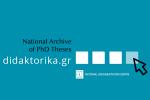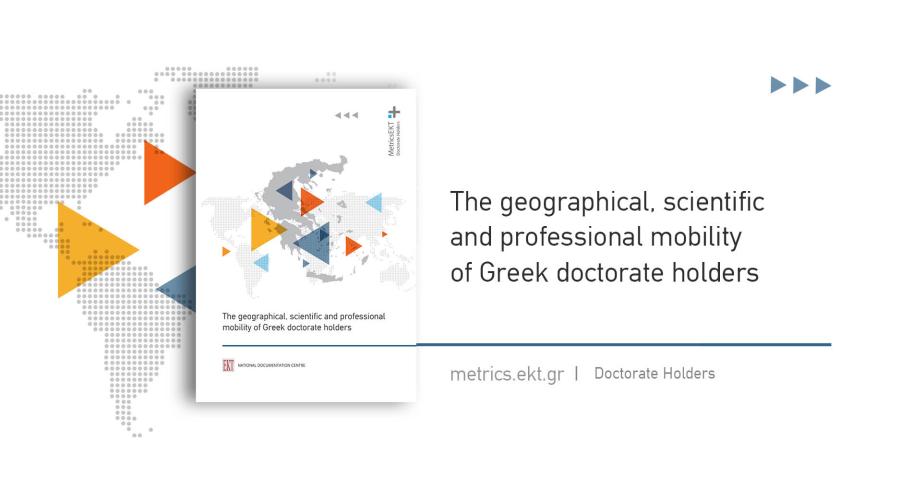
A comprehensive picture of the geographical, scientific and professional mobility of Greek PhD holders is reflected in the results of the extensive census survey conducted by the National Documentation Centre (EKT) in collaboration with the Regional Development and Policy Research Unit (RDPRU) University of Macedonia. Some of the interesting survey findings include the following: Greek doctorate holders generally have more than one degree; show a very high employment rate (97.5%), mainly in the public sector (66%), with a significant percentage (31.3%) having work experience abroad; 14.8% of PhD holders continue to work abroad while maintaining strong ties with Greece and 46.3% of them intend to return to Greece in the coming years.
The aim of the survey, in which 10,295 doctorate holders out of the total population of Greek doctorate holders registered in the National Archive of PhD Theses during the period 1985-2018 participated, was the detailed recording of this part of the population, characterised as highly skilled human resources and is directly linked to economic growth and social well-being indicators.
The publication 'The geographical, scientific and professional mobility of Greek doctorate holders' published by EKT, presents detailed data on the demographics of PhD holders; the choice of institutions from which they receive their degrees in Greece and abroad; their professional choices and how they are related to their scientific field; their geographical mobility during and after their studies; the correlation of mobility with the labour market as well as economic and other factors that influenced their decisions.
A more specific goal of the survey is the in-depth understanding of their geographical mobility, with emphasis on their migration abroad (brain drain). For this very reason, the data are presented in sections based on the geographical mobility of Greek PhD holders as follows: a) those who have never worked outside Greece and live in Greece; b) those who have worked abroad for some time but now live in Greece, c) those who live abroad; d) those who worked abroad, returned to Greece, but now live and work abroad.
As the Director EKT, Dr. Evi Sachini, points out, 'EKT, with its statistical and survey activity, seeks to highlight the contribution of highly skilled human resources in the research and innovation system and in the economy as a whole. By implementing a series of actions, surveys and studies, and by providing a wealth of processed data, EKT enables both researchers to deepen their analysis on individual issues, and the State to produce evidence-based public policies for the most effective exploitation of the valuable human resources that the country has, wherever in the world they may be.'
Key findings of the survey
Greek doctorate holders generally have more than one degree: 10.4% have a second degree; 74.4% have a master's degree; 14.9% have a second master's degree; 0.8% have a second doctorate, while 11.2% have conducted postdoctoral research (postdoc). Their degrees are mainly in Health Sciences, Natural Sciences, Mathematics and Statistics. A significant percentage obtained their degrees abroad: 8% received their first degree abroad, 22.4% their postgraduate degree, 2.8% their doctorate and 26.3% their postdoctoral fellowship.
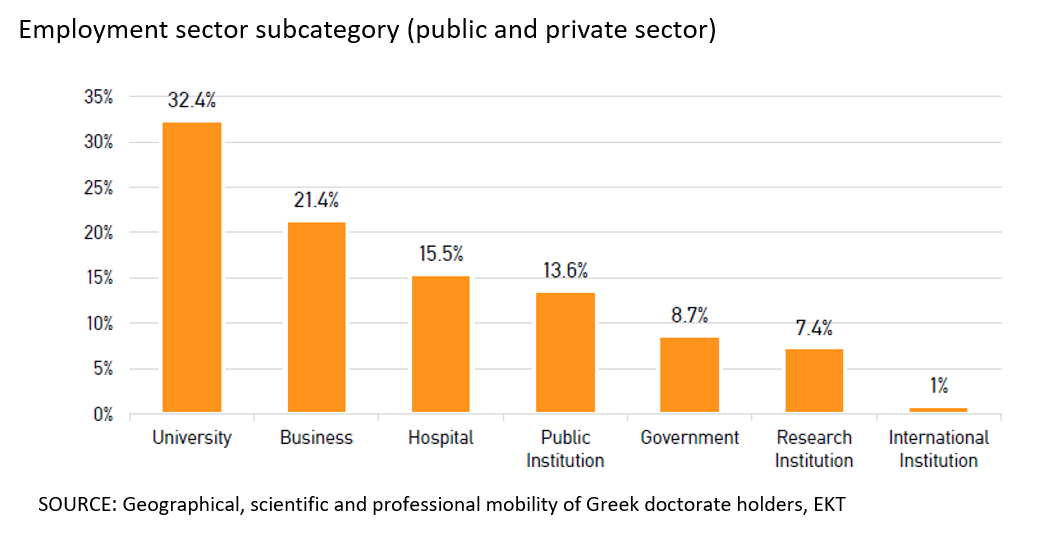
95.7% of the PhD holders surveyed work mainly in the public sector (66%) and to a lesser extent in the private sector (33.8%). A significant percentage of them work at universities (32.4%) or research centres (7.4%) and 21.4% for businesses.
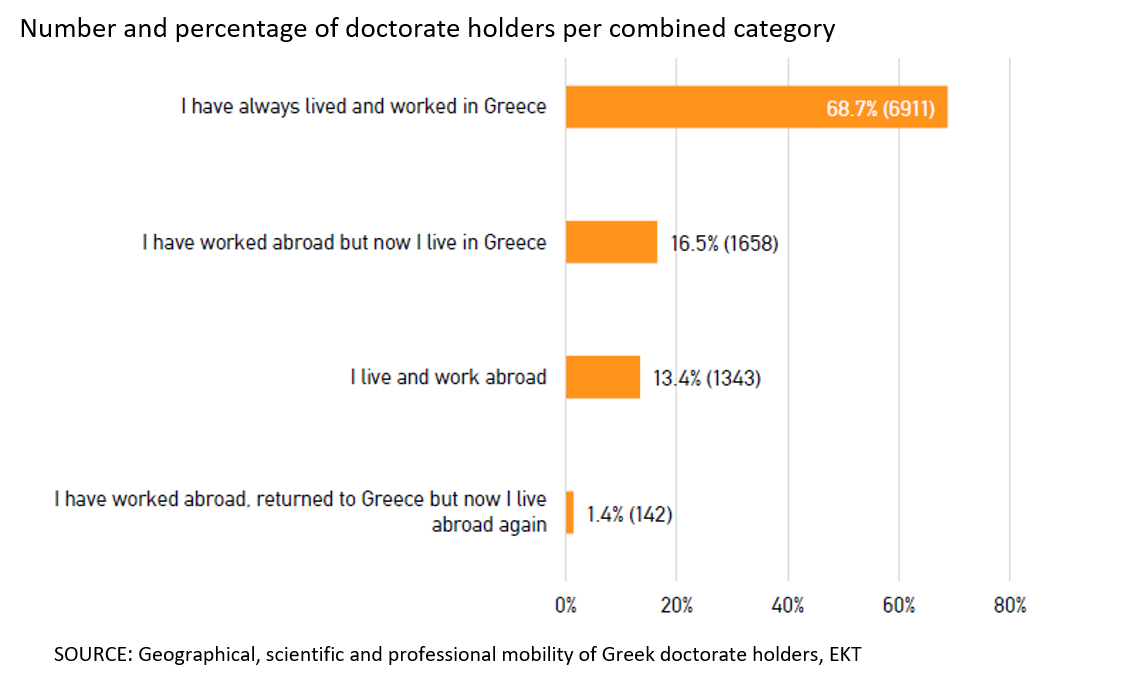
In terms of their geographical mobility, 31.3% of PhD holders have worked abroad for some time (in fact 14.8% still live and work abroad today). 68.7% of PhDs have never left Greece, and 82.2% of these have no intention of moving abroad.
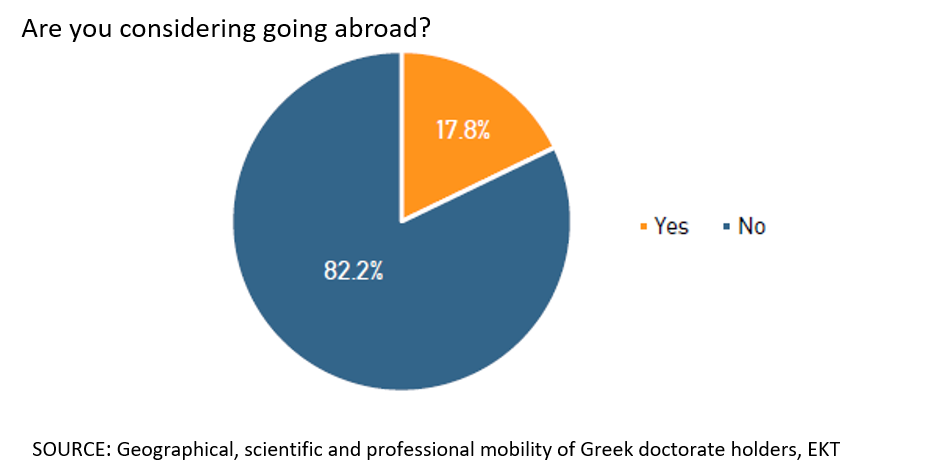
Regarding the doctorate holders who living and working in Greece (and have never worked outside Greece), 42.9% are 'Professionals', 27.6% 'Teaching staff at higher education and research institutions', 15% 'Senior managers and administrators', 7.6% 'Employees (public or private)' and 5.7% 'Researchers'.
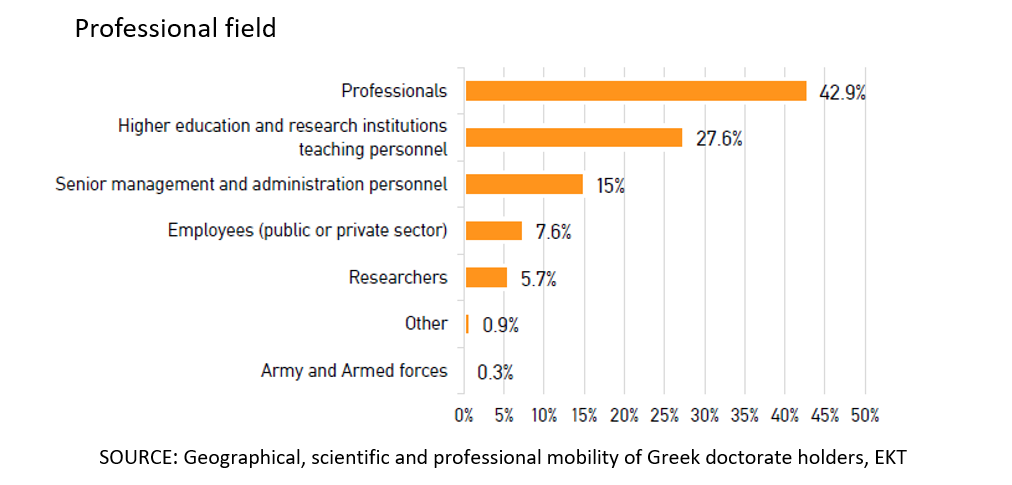
Of the doctorate holders living abroad, 40.3% stated that they are 'Teaching staff at higher education and research institutions', 32.2% 'Professionals', 15% 'Researchers', 9.5 % 'Senior managers and administrators' and 2.6% 'Employees (public or private)'.
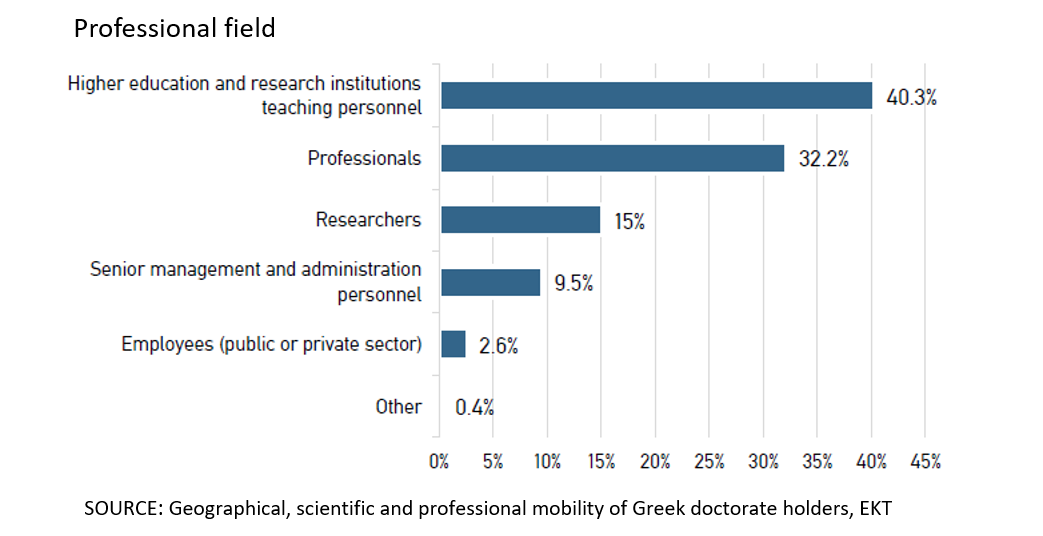
73.8% of the doctorate holders who live and work abroad had worked in Greece before going abroad. 52.6% of them, prior to going abroad, had had secure employment and/or a good salary or in a area related to their studies. Most left Greece after 2011 (72.8%), for reasons directly related to work (professional development, better working conditions, better financial earnings and work in their field), while using the same criteria to choose the country in which to settle.
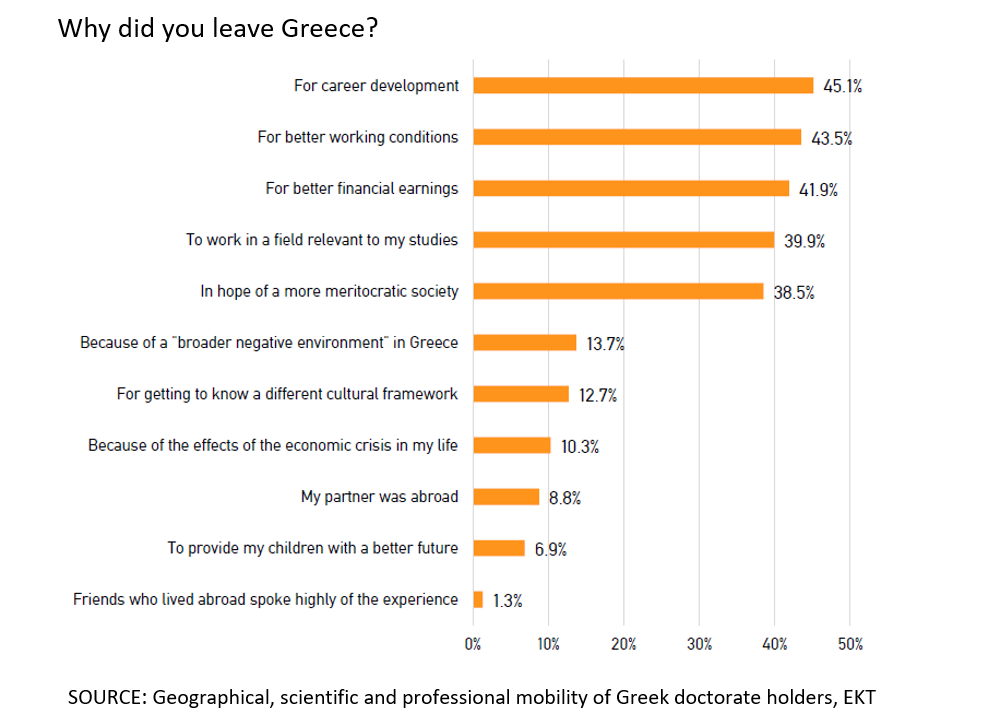
Greek PhD holders live/have lived in more than 50 countries, mainly in the United Kingdom, the USA, Germany and France (30.8% in more than one country), as well as in more than 500 cities, mainly in London, Paris, Boston, Nicosia and New York. It is worth noting that 67.5% of those living abroad have worked/are working in one of the 10 most innovative countries in the world, and 75.2% are living in cities that are considered world metropolises.
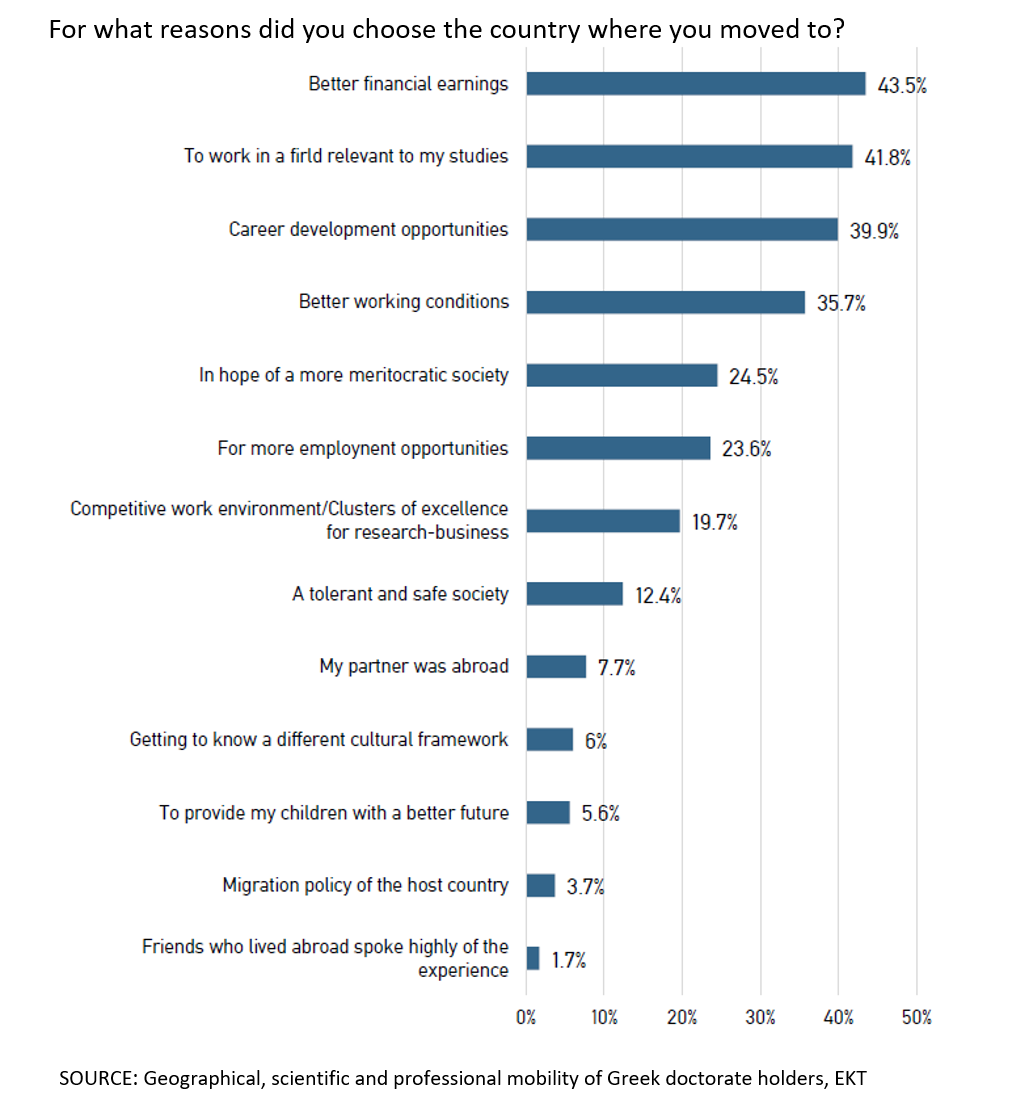
Intention to return to Greece
Of particular interest are the survey findings regarding the intention of Greek doctorate holders living abroad to return to Greece. 61.4% of them are thinking of returning immediately, 39% intend to return in '1-2 years' and 22.4% 'this year'. They also maintain strong ties with Greece, as 95% come to Greece at least once a year.

The conditions and reasons for returning to Greece depend mainly on the likelihood of finding a job. 69.7% said they would return if they found 'work commensurate with [their] qualifications in Greece', 43% would return for 'family reasons' and 35.6% if 'one of the two partners found work in Greece that was financially satisfactory'.
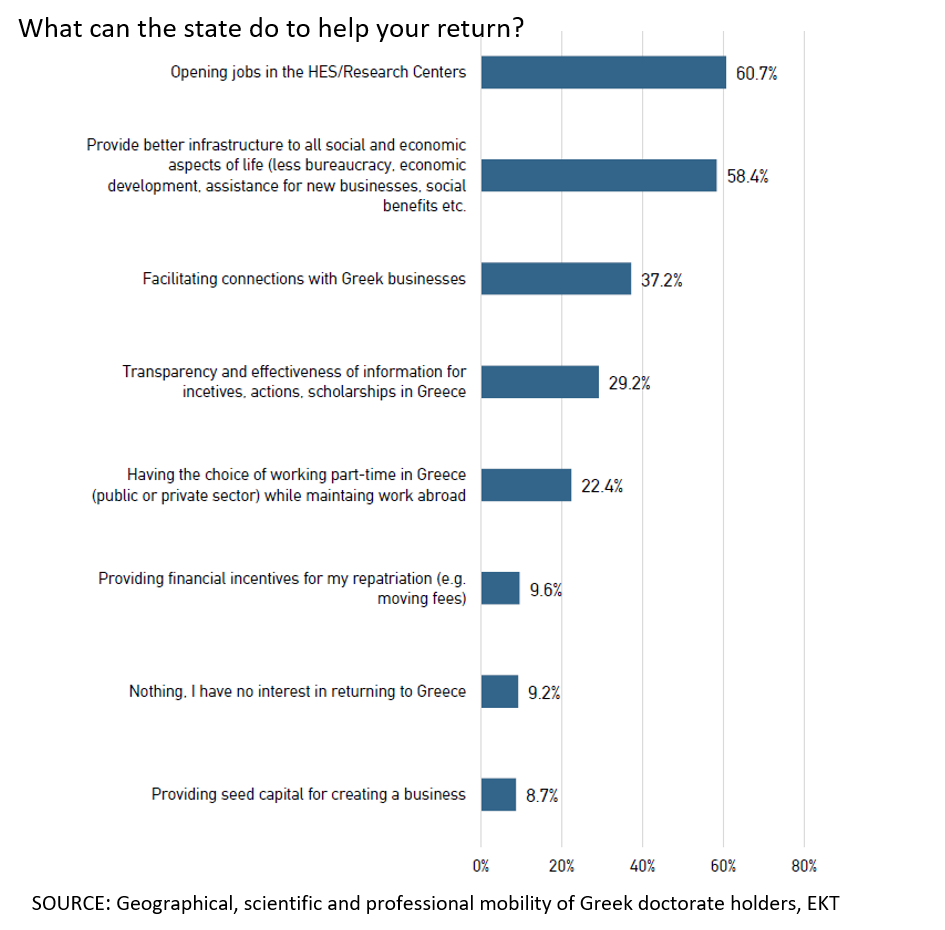
When asked what the state can do to help their return, 60.7% said that a sufficient condition is 'to advertise new jobs at HEIs / Research Centres' and 58.4% to improve the general conditions in the country (social infrastructure, improvement of the economy, etc.)'. A significant number stated that the link between those working abroad with Greece must be improved. Specifically, 37.2% believe that 'the possibilities of their connection with the Greek research community should be improved' and 29.2% that they need 'transparency and immediacy in the information about incentives-scholarships offered in Greece'. Only 9.2% said they were not interested in returning.
The quantitative and qualitative data of the survey helps in better understanding the geographical, scientific and professional mobility of Greek doctorate holders enabling the development of effective policies to encourage them to remain in Greece, to return or to be made use of while abroad.
About the survey
The survey was conducted by the National Documentation Centre (EKT) (http://www.ekt.gr) in collaboration with the Research Unit for Regional Development and Policy (RDPRU) of the University of Macedonia, drawing on the experience of previous EKT surveys and that of the RDPRU in terms of geographical mobility and especially the 'brain drain'. The population of the survey was drawn from the register of doctorate holders kept at EKT, which includes doctorated holders whose doctoral dissertations were awarded during the period 1985 to 2018 and have been submitted to the National Archive of PhD Theses (N.A.Ph.D).
The survey was designed as a census, to be a reference survey, and therefore concerned all the doctorate holders registered in the N.A.Ph.D, in order to capture the cognitive (scientific and technological), professional and geographical characteristics of Greek doctorate holders. It is important to emphasise this fact as so far research conducted internationally has been conducted on samples and not on the entire population concerned. The survey was conducted with a structured electronic questionnaire, which was sent to 22,350 PhD holders (whose contact details were available) and was completed by 10,295 of these.
The findings of the survey, presented in the EKT publication, together with the detailed data and the detailed analysis that accompanies them, constitute valuable data about the country's highly skilled human resources. This data can be used not only by researchers but also by public administration, government and political parties, who design public policies in a range of fields and topics (education, research, development, tackling brain drain, etc.).
EKT statistics and surveys for Greek doctors
The survey was carried out as part of EKT's activities as a National Authority of the Hellenic Statistical System, with responsibility for the broader sectors of research, development, innovation and digital economy. Within this context, EKT annually produces the official national 'statistics for doctoral degree holders', with data drawn from the National Archive of PhD Theses (N.A.Ph.D), which is kept at EKT, and the questionnaires completed by the doctorate holders. It should be noted that the first survey in Greece on the careers of Greek doctorate holders was conducted by EKT in 2014, within the framework of the global survey 'International Survey on Careers of Doctorate Holders - CDH', conducted by the Organisation for Economic Co-operation and Development (OECD) . The survey covered all PhD holders residing in Greece in 2013 and the results were published in EKT's publication 'PhD holders in Greece: career and mobility' (2015).
Knowledge and Partneship Bridges
EKT implements the 'Knowledge and Partnership Bridges' initiative, with the main goal of connecting Greek scientists and entrepreneurs around the world, exchanging knowledge and strengthening their co-operation for the development of the Greek economy. As part of the initiative and publicity actions throughout the network, a large number of research questionnaires were completed, mainly by Greek doctorate holders living abroad.
Through the renewed networking platform www.knowledgebridges.gr, specialised solutions are offered those who are looking for partners and access to useful information for financial opportunities, scholarships and studies in Greece, as well as those who wish to receive guidance from trained mentors and seminars for further professional and personal development.
Links
- 'Geographical, scientific and professional mobility of Greek doctorate holders' (EN)
- 'Geographical, scientific and professional mobility of Greek doctorate holders' (EL)
- ΕΚΤ – metrics & statistics for Research, Development and Innovation
- metricsEKT - Statistics on PHD Holders (EL)
- Research Unit for Regional Development and Policy (RDPRU) of the University of Macedonia
- National Archive of PhD Theses
- Knowledge and Partnership Bridges
- EKT's Press Release (EL)










